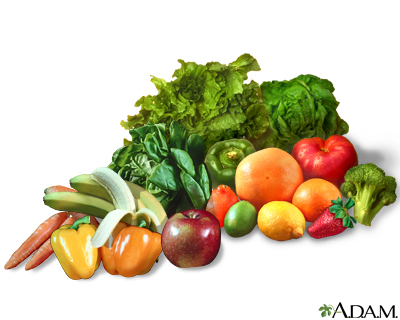Definition
Vitamins are a group of substances that are needed for normal cell function, growth, and development.
There are 13 essential vitamins. This means that these vitamins are required for the body to work properly. They are:
Vitamins are grouped into two categories:
- Fat-soluble vitamins are stored in the body's liver, fatty tissue, and muscles. The four fat-soluble vitamins are vitamins A, D, E, and K. These vitamins are absorbed more easily by the body in the presence of dietary fat.
- Water-soluble vitamins are not stored in the body. The nine water-soluble vitamins are vitamin C and all the B vitamins. Any leftover or excess amounts of these leave the body through the urine. They have to be consumed on a regular basis to prevent shortages or deficiencies in the body. The exception to this is vitamin B12, which can be stored in the liver for many years.
Some vitamin-like nutrients are also needed by the body such as:
Function
Each of the vitamins listed below has an important job in the body. A vitamin deficiency occurs when you do not get enough of a certain vitamin. Vitamin deficiency can cause health problems.
Not eating enough fruits, vegetables, beans, lentils, whole grains and fortified dairy foods may increase your risk for health problems, including heart disease, cancer, and poor bone health (osteoporosis).
- Vitamin A helps form and maintain healthy teeth, bones, soft tissue, mucous membranes, and skin.
- Vitamin B6 is also called pyridoxine. Vitamin B6 helps form red blood cells and maintain brain function. This vitamin also plays an important role in the proteins that are part of many chemical reactions in the body. The more protein you eat the more pyridoxine your body requires.
- Vitamin B12, like the other B vitamins, is important for metabolism. It also helps form red blood cells and maintain the central nervous system.
- Vitamin C, also called ascorbic acid, is an antioxidant that promotes healthy teeth and gums. It helps the body absorb iron and maintain healthy tissue. It is also essential for wound healing.
- Vitamin D is also known as the "sunshine vitamin," since it is made by the body after being in the sun. Ten to 15 minutes of sunshine 3 times a week is enough to produce the body's requirement of vitamin D for most people at most latitudes. People who do not live in sunny places may not make enough vitamin D. It is very hard to get enough vitamin D from food sources alone. Vitamin D helps the body absorb calcium. You need calcium for the normal development and maintenance of healthy teeth and bones. It also helps maintain proper blood levels of calcium and phosphorus.
- Vitamin E is an antioxidant also known as tocopherol. It helps the body form red blood cells and use vitamin K.
- Vitamin K is needed because without it, blood would not stick together (coagulate). Some studies suggest that it is important for bone health.
- Biotin is essential for the metabolism of proteins and carbohydrates, and in the production of hormones and cholesterol.
- Niacin is a B vitamin that helps maintain healthy skin and nerves. It also has cholesterol-lowering effects at higher doses.
- Folate works with vitamin B12 to help form red blood cells. It is needed for the production of DNA, which controls tissue growth and cell function. Any woman who is pregnant should be sure to get enough folate. Low levels of folate are linked to birth defects such as spina bifida. Many foods are now fortified with folate in the form of folic acid.
- Pantothenic acid (vitamin B5) is essential for the metabolism of food. It also plays a role in the production of hormones and cholesterol.
- Riboflavin (vitamin B2) works with the other B vitamins. It is important for body growth and the production of red blood cells.
- Thiamine (vitamin B1) helps the body cells change carbohydrates into energy. Getting enough carbohydrates is very important during pregnancy and breastfeeding. It is also essential for heart function and healthy nerve cells.
- Choline helps in normal functioning of the brain and nervous system. Lack of choline can cause swelling in liver.
- Carnitine helps the body to change fatty acids into energy.
Food Sources
FAT-SOLUBLE VITAMINS
Vitamin A:
- Dark-colored fruits
- Dark leafy vegetables
- Egg yolk
- Fortified milk and dairy products (cheese, yogurt, butter, and cream)
- Liver, beef, and fish
Vitamin D:
- Fish (fatty fish such as salmon, mackerel, herring, and orange roughy)
- Fish liver oils (cod liver oil)
- Fortified cereals
- Fortified milk and dairy products (cheese, yogurt, butter, and cream)
Vitamin E:
- Avocado
- Dark green vegetables (spinach, broccoli, asparagus, and turnip greens)
- Margarine (made from safflower, corn, and sunflower oil)
- Oils (safflower, corn, and sunflower)
- Papaya and mango
- Seeds and nuts
- Wheat germ and wheat germ oil
Vitamin K:
- Cabbage
- Cauliflower
- Cereals
- Dark green vegetables (broccoli, Brussels sprouts, and asparagus)
- Dark leafy vegetables (spinach, kale, collards, and turnip greens)
- Fish, liver, beef, and eggs
WATER-SOLUBLE VITAMINS
Biotin:
- Chocolate
- Cereal
- Egg yolk
- Legumes
- Milk
- Nuts
- Organ meats (liver, kidney)
- Pork
- Yeast
Folate:
- Asparagus and broccoli
- Beets
- Brewer's yeast
- Dried beans (cooked pinto, navy, kidney, and lima)
- Fortified cereals
- Green, leafy vegetables (spinach and romaine lettuce)
- Lentils
- Oranges and orange juice
- Peanut butter
- Wheat germ
Niacin (vitamin B3):
- Avocado
- Eggs
- Enriched breads and fortified cereals
- Fish (tuna and salt-water fish)
- Lean meats
- Legumes
- Nuts
- Potato
- Poultry
Pantothenic acid:
- Avocado
- Broccoli, kale, and other vegetables in the cabbage family
- Eggs
- Legumes and lentils
- Milk
- Mushroom
- Organ meats
- Poultry
- White and sweet potatoes
- Whole-grain cereals
Thiamine (vitamin B1):
- Dried milk
- Egg
- Enriched bread and flour
- Lean meats
- Legumes (dried beans)
- Nuts and seeds
- Organ meats
- Peas
- Whole grains
Pyridoxine (vitamin B6):
- Avocado
- Banana
- Legumes (dried beans)
- Meat
- Nuts
- Poultry
- Whole grains (milling and processing removes a lot of this vitamin)
Vitamin B12:
- Meat
- Eggs
- Fortified foods such as soymilk
- Milk and milk products
- Organ meats (liver and kidney)
- Poultry
- Shellfish
NOTE: Animal sources of vitamin B12 are absorbed much better by the body than plant sources.
Vitamin C (ascorbic acid):
- Broccoli
- Brussels sprouts
- Cabbage
- Cauliflower
- Citrus fruits
- Potatoes
- Spinach
- Strawberries
- Tomatoes and tomato juice
Side Effects
Many people think that if some is good, a lot is better. This is not always the case. High doses of certain vitamins can be toxic. Ask your health care provider what is best for you.
Recommendations
The Recommended Dietary Allowances (RDAs) for vitamins reflect how much of each vitamin most people should get each day.
- The RDA for vitamins may be used as goals for each person.
- How much of each vitamin you need depends on your age and sex. Other factors, such as pregnancy and your health conditions, are also important.
The best way to get all the daily vitamins you need is to eat a balanced diet that contains a wide variety of fruits, vegetables, fortified dairy foods, legumes (dried beans), lentils, and whole grains.
Dietary supplements are another way to get the vitamins you need if the food you eat is not supplying enough vitamins. Supplements can be helpful during pregnancy and for special medical problems.
If you take supplements, do not take more than 100% of the RDA unless you are under a provider's supervision. Be very careful about taking large amounts of fat-soluble vitamin supplements. These include vitamins A, D, E, and K. These can build up in your body and may cause harmful effects.
References
Mason JB, Booth SL. Vitamins, trace minerals, and other micronutrients. In: Goldman L, Schafer AI, eds. Goldman-Cecil Medicine. 26th ed. Philadelphia, PA: Elsevier; 2020:chap 205.
Markell M, Siddiqi HA. Vitamins and trace elements. In: McPherson RA, Pincus MR, eds. Henry's Clinical Diagnosis and Management by Laboratory Methods. 24th ed. Philadelphia, PA: Elsevier; 2022:chap 27.


